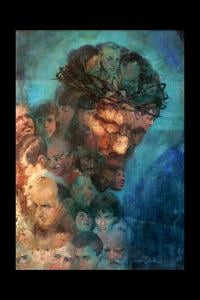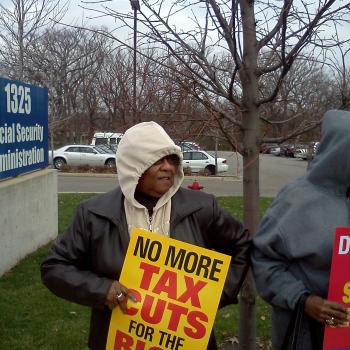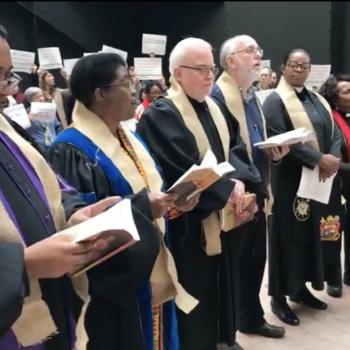
We are in the Advent season. As Christians, Advent is a time of hope and renewal. It is the time where we prepare to celebrate the birth of our Lord, it is a season of looking forward and waiting for something greater. It is the season where as Christians we look back and celebrate the birth of Jesus in a humble stable in Bethlehem. But we are not really celebrating the birth of a baby. Throughout history there have been billions of babies born. As the father of four children I certainly believe that their births were important and hope each of my children in their own unique way, will contribute to the common good. What is different and significant about the birth of Jesus, is that in this birth we have the incarnation of God Himself. As John begins his gospel with, “In the beginning was the Word, and the Word was with God, and the Word was God.” And then at the end of the prologue, he says, “And the Word became flesh and dwelt among us.”
What is it that we are actually waiting for? I was taught that we are waiting for the second coming of Jesus. When Jesus returns to create heaven on Earth. Yet in Matthew 28:20 it says: “And behold, I am with you always.” If Jesus is always with us, why are we sitting around waiting for his return? The Advent season is often described as a time of preparation. But again what are we preparing for? Are we preparing for the day when all of God’s people will celebrate together in unity? As it says in Revelation 7: “After this I looked, and there before me was a great multitude that no one could count, from every nation, tribe, people and language, standing before the throne…” If we are waiting for the day when we all stand in unity, we certainly have a peculiar way of preparing for it. One might think that a good way to prepare for that day would be to start practicing living in unity today.
Instead we are more divided and tribal today than when the Incarnation first happened. We hear countless reports, proclamations and sermons about how we have taken Christ out of Christmas. We spend our time arguing over whether we should say Merry Christmas or Happy Holiday. As if God really cares about whether we say Merry Christmas or Happy Holiday or nothing at all. Do we honestly believe that God sits around and gets angry because Johnny wished Sally a happy holiday instead of a Merry Christmas? I mean seriously how small and petty do we think God is? I think that God would be more upset at us not feeding the hungry than not wishing the hungry a Merry Christmas. There is such a big deal made about what we say at Christmas that one would think it is the greatest sin ever. Yet last October when speaking to a group of young people Pope Francis was asked what the greatest sin is. His response is prophetic. He said; “the sickness or, you can say the sin, that Jesus condemns most is hypocrisy,” which is precisely what is happening when someone claims to be a Christian but does not live according to the teaching of Christ. “You cannot be a Christian without living like a Christian…You cannot be a Christian without practicing the Beatitudes. You cannot be a Christian without doing what Jesus teaches us in Matthew 25, which is to feed the hungry, clothe the naked and welcome the stranger. Imagine that of all of our evils all of our fallacies Jesus condemns the sin of hypocrisy most of all.”
To fully understand what we are preparing for we first have reflect on and understand what is the Incarnation. I was taught that Jesus came to save us. He came as a healer to heal us from our sins. That Theology suggests that God demanded a blood sacrifice before he would forgive us and open the gates of Heaven. Kind of gets us back to that small petty God. Franciscan scholars like Blessed Don Scotus, the 13th century theologian considered among the most influential Franciscans in the worlds of philosophy and theology, had a different theology around the Incarnation. As Sr. Ilia Delio, OFS describes it in her essay, Revisiting the Franciscan Doctrine of Christ, “God wills ordinately and thus intends the end, and that which is closer to the end. In Scotus’s terms, God is perfect love and wills according to the perfection of that love. Since perfect love cannot will anything less than the perfection of love, Christ would have come in the highest glory in Creation even if there was no sin and thus no need for redemption.” So if the Incarnation is not about redemption what is it about, what are we preparing for? Steve Clark who founded the Sword and the Spirit says it very well in his 2008 article The Real Meaning of Christmas What the Incarnation means for us. Clark says: “God became man in Jesus Christ, and as a result of that incarnation God has poured out his Holy Spirit on us to give us the power actually to live the life of God. He has poured out his Spirit so that there may be a body of people, the body of Christ, who truly live like God himself. Other people should be able to see us and say, “Here is a type of human being different from all other human beings. Here is a kind of life that no other human has.” What they should be able to see in us is the very life of God himself.”
What Clark is saying is that the Incarnation is not about redemption but restoration. Restoring us to the Imago Dei, the image of God. Most of our worldview is centered on how we see God. What is our Imago Dei? In Genesis 1:26 it says “Then God said, ‘Let us make man in our image, after our likeness.” If we view God as an old white man, separated from us, sitting on a throne judging, condemning, demanding retribution for petty offenses and we are created in God’s image… well that might explain a great deal. It appears that we have turned things around and created a god in our image instead of how the scripture describes it. Let me offer a story to explain.
Many years ago I was working in Connecticut for a company that was located in Philadelphia. I was the entire Connecticut operation, which gave me a certain amount of flexibility. There was a church up the street from my office that had a 9:00 daily Mass. Being an early riser, I would get to my office around 7am, get some work done than walk down to the church for Mass at 9am. A young priest, just recently ordained, was assigned to the parish. When he said daily Mass he seemed a little awkward and out of place. One particular day seemed slightly different. After he read the Gospel he stopped for a moment and then barely mentioned the readings as he started his homily. He talked about how we are in Advent season, the time where we should be preparing for the birth of Jesus. He mentioned that he had gone to the Mall on Saturday. I perked up because I also had been there and remembered seeing him. We had given each other that nod of acknowledgement you give to someone you have met but don’t really know. He continued about how he hoped he would see signs of the real meaning of Christmas. He was clearly on a mission as he talked about not seeing the image of God anywhere. He even commented about the sales people saying happy holiday instead of Merry Christmas. When he was finished he just stood there for a few moments looking self-assured and confident that his homily would strike a chord and inspire.
After Mass I was walking out and the priest came over to me. He said to me, “You were there on Saturday, did you feel the same way?” I replied that yes I was there but I saw images of God everywhere I looked. He was taken aback and asked me what I meant and I offered two examples. I told him that I was in a toy store and noticed a woman at the cashier. She was disheveled, her clothes were torn. She was fumbling in her purse looking for change. The line was getting long as she started counting her pennies. She apologized and said her husband has been sick and they are struggling to even put food on the table. But she wanted to have just a few small toys under the tree for her children. You could sense her pain and hurt. A few moments later, a man got out of line came to the front put his credit card down and told the cashier to put all of her toys on his card. Another woman came forward and handed her a gift certificate saying that she was originally going to use it to buy toys for her children, however she concluded that they have enough so offered the certificate to the woman at the front of the line. Another woman approached and handed her a gift card to a grocery store. As I continued walking around the mall I noticed a group teenagers. They were being teenagers hanging out at the mall with no real purpose. Nearby, I also noticed a woman with three small children struggling to shop. Two of the children were in a carriage and the third was around 4 or 5 years old. The kids were crying, running around and being young children. The woman was frustrated and it was clear this was not a pleasant experience for her. A little while later, I noticed both the teenagers and the woman together. They whole group would head to a store in which the woman wanted to shop. The mother would go in the store, while the teens watched her children. I knew one of the teen girls, so I asked her if they knew the woman. She replied no but they saw she was having a hard time and since they were just hanging around they offered to go with her and watch her kids so she could shop.
I told the priest that maybe he was looking in the wrong places because everywhere I looked I saw images of God. Perhaps during Advent we should prepare by becoming the Imago Dei and to see the image of God in everyone and everything. Then it would not matter if we said Merry Christmas, happy holiday or anything else because we would be part of the Incarnation.
Peace and All Good












